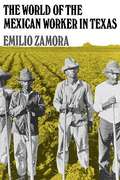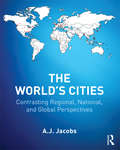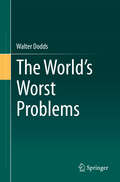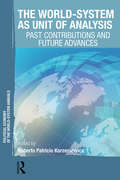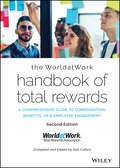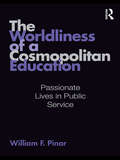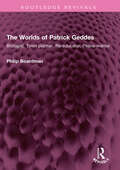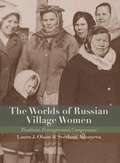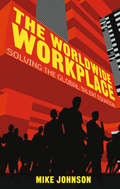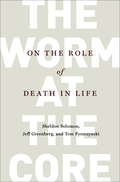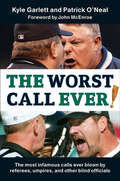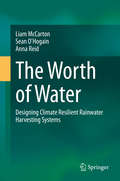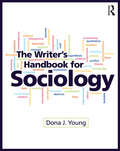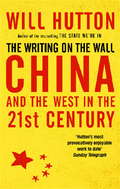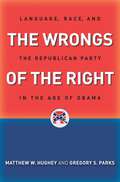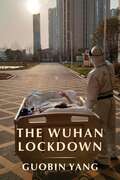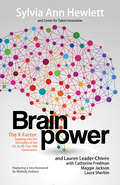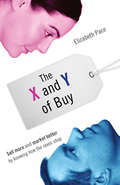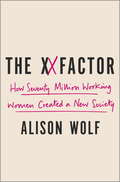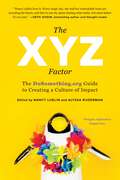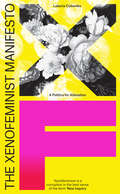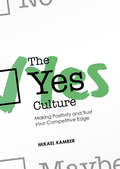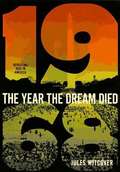- Table View
- List View
The World of the Mexican Worker in Texas
by Emilio ZamoraTaking a "New Labor History" perspective, Zamora focuses on Mexican workers' efforts to deal with the changes caused by industrialization at the beginning of the 20th century. In response to their exploitation, Mexican workers responded with "a wide array of actions that were defensive and combative, informal and formal, spontaneous and sustained." Annotation c. by Book News, Inc., Portland, Or.
The World's Cities: Contrasting Regional, National, and Global Perspectives (The Metropolis and Modern Life)
by A. J. JacobsThe World’s Cities offers instructors and students in higher education an accessible introduction to the three major perspectives influencing city-regions worldwide: City-Regions in a World System; Nested City-Regions; and The City-Region as the Engine of Economic Activity/Growth. The book provides students with helpful essays on each perspective, case studies to illustrate each major viewpoint, and discussion questions following each reading. The World’s Cities concludes with an original essay by the editor that helps students understand how an analysis incorporating a combination of theoretical perspectives and factors can provide a richer appreciation of the world’s city dynamics.
The World's Worst Problems
by Walter DoddsThis book addresses the worst problems currently facing humanity and those that may pose future threats. The problems are explained and approached through a scientific lens, and categorized based on data involving global mortality, vulnerability, and threat level. The book presents indices of problem severity to compare relative intensity of current and potential crises. The approach avoids emotional argument using mainly empirical evidence to support the classification of relative problem severity. The author discusses multiple global problems and ranks them. He also explores specific solutions to each problem, links problems to human behavior from a social science perspective, considers international cooperation, and finally pathways to solutions.The book discusses confirmation bias and why this necessitates a scientific approach to tackle problems. The moral assumption that each person has the same rights to life and minimal suffering, and that the natural world has a right to exist, forms the basis of ranking problems based on death, suffering, and harm to the natural world. A focus is given to potential disasters such as asteroid collisions and super-volcanic eruptions, which are then presented in chapters that address specific contemporary global issues including disease, hunger, nuclear weapons and climate change. Furthermore the author then ranks the problems based on an index of problem severity, considering what other people think the worst problems are. The relative economic costs to solve each of these problems, individual behavior in the face of these problems, how people could work together internationally to combat them, and a general pathway toward solutions form the basis of the final chapters. This work will appeal to a wide range of readers, students considering how they can help the world, and scientists and policy makers interested in global problem solving.
The World-System as Unit of Analysis: Past Contributions and Future Advances (Political Economy of the World-System Annuals)
by Roberto Patricio KorzeniewiczWorld-system analyses have recast the study of between- and within-nation country inequality as constituent aspects of a single field of inquiry: the study of inequality and social stratification as processes that always have been global in their very essence. World-system analyses maintain that global social stratification pivots around institutional arrangements that render distributional outcomes as simultaneously “national,” “gendered,” “racialized,” and “global” processes. This book takes stock of some of the enduring theoretical and empirical contributions of a world-system perspective, and identifies promising directions for future inquiry and discussion. Some chapters reassess the scope and methodologies of world-system analysis around several key problems (e.g., the spatial and temporal boundaries of global commodity chains, the construction and challenge of various dimensions of social inequality, systemic and antisystemic social movements). Others take stock of areas in which world-systems are promoting methodological innovation and/or generating useful global data, and identify questions that demand additional methodological and empirical attention for future research. In different ways, this book help us to critically reconsider some of the enduring legacies within a world-system perspective (such as Karl Polanyi’s concept of the “double movement,” or the distinction drawn by Giovanni Arrighi or Immanuel Wallerstein between systemic and antisystemic movements). As argued by many of the authors in this book, a world-historical approach calls for greater sensitivity to the manifold ways in which conceptual boundaries change over time and space. Taking seriously the issue of unit of analysis, this book explores critically productive ways for better understanding global patterns of continuity and change.
The WorldatWork Handbook of Total Rewards: A Comprehensive Guide to Compensation, Benefits, HR & Employee Engagement
by WorldatWorkEquip yourself to manage, motivate, compensate, and reward everyone in this workplace revolution The future of work is here. From the shift to Millennials and Gen Z in the workforce to the advent of the Fourth Industrial Revolution and the Gig Economy, the world of work and rewards has significantly changed since the initial WorldatWork Handbook was published. Human resources and total rewards professionals need tools to equip them to manage a changing workforce. This completely revised second edition addresses the challenging and disruptive issues facing employers today and tomorrow. The WorldatWork Handbook of Total Rewards is the definitive authority on compensation and rewards from the leading global nonprofit organizations for professionals who are engaged in the critically important practice of total rewards. This book is a go-to resource for all business professionals and leaders who reward and create productive, committed and inspired workforces worldwide. Readers will learn the basics of rewards, along with a deep dive and high-level view of how rewards programs enable organizations to deliver on their brand promises and perform at their optimal level. Gain a thorough understanding of compensation and benefits, along with employee well-being, development, and recognition, all updated to address the realities of today’s workplace. Understand why the Millennial and Gen Z workforce requires a different value proposition, and how to meet their needs. Discover the tools and techniques you need to help you reskill and become a highly valued workforce contributor and leader in the digital era. Learn how to attract, retain, and engage talent by building a healthy workplace culture and employing unique incentives that drive high performance and loyalty. Technical enough for specialists but broad in scope for managers and HR generalists, this well-rounded resource belongs on the desk of anyone interested in organizational effectiveness. An indispensable tool for understanding and implementing the total rewards concept, The WorldatWork Handbook of Total Rewards, Second Edition is the key to designing programs and practices that ensure employee engagement and organizational success.
The Worldliness of a Cosmopolitan Education: Passionate Lives in Public Service (Studies in Curriculum Theory Series)
by William PinarPinar positions himself against three pressing problems of the profession: the crime of collectivism that identity politics commits, the devaluation of academic knowledge by the programmatic preoccupations of teacher education, and the effacement of educational experience by standardized testing. A cosmopolitan curriculum, Pinar argues, juxtaposes the abstract and the concrete, the collective and the individual: history and biography, politics and art, public service and private passion. Such a curriculum provides passages between the subjective and the social, and in so doing, engenders that worldliness a cosmopolitan education invites. Such worldliness is vividly discernible in the lives of three heroic individuals: Jane Addams (1860-1935), Laura Bragg (1881-1978), and Pier Paolo Pasolini (1922-1975). What these disparate individuals demonstrate is the centrality of subjectivity in the cultivation of cosmopolitanism. Subjectivity takes form in the world, and the world is itself reconstructed by subjectivity’s engagement with it. In this intriguing, thought-provoking, and nuanced work, Pinar outlines a cosmopolitan curriculum focused on passionate lives in public service, providing one set of answers to how the field accepts and attends to the inextricably interwoven relations among intellectual rigor, scholarly erudition, and intense but variegated engagement with the world.
The Worldly Philosophers: The Lives, Times and Ideas of the Great Economic Thinkers
by Robert HeilbronerAdam Smith, Malthus, David Ricardo, Karl Marx, Thorstein Veblen, John Maynard Keynes, and more...
The Worlds of Patrick Geddes: Biologist, Town planner, Re-educator, Peace-warrior (Routledge Revivals)
by Philip BoardmanFirst published in 1978, The Worlds of Patrick Geddes is a study of Patrick Geddes’ thought and action, his relationships and his life, as someone who defied labelling and who was years ahead of his contemporaries. The work of Patrick Geddes (1854-1932) is coming to be more and more widely appreciated, as his ideas on many diverse subjects are being gradually assimilated into the mainstream of modern thought. Geddes has been confidently labelled as a biologist, town-planner, sociologist and educator; but he was all of these and more. This book will be of interest to students of biology, urban planning and sociology.
The Worlds of Russian Village Women
by Laura J. Olson Svetlana AdonyevaRussian rural women have been depicted as victims of oppressive patriarchy, celebrated as symbols of inherent female strength, and extolled as the original source of a great world culture. Throughout the years of collectivization, industrialization, and World War II, women played major roles in the evolution of the Russian village. But how do they see themselves? What do their stories, songs, and customs reveal about their values, desires, and motivations? Based upon nearly three decades of fieldwork, from 1983 to 2010,The Worlds of Russian Rural Womenfollows three generations of Russian women and shows how they alternately preserve, discard, and rework the cultural traditions of their forebears to suit changing needs and self-conceptions. In a major contribution to the study of folklore, Laura J. Olson and Svetlana Adonyeva document the ways that women’s tales of traditional practices associated with marriage, childbirth, and death reflect both upholding and transgression of social norms. Their romance songs, satirical ditties, and healing and harmful magic reveal the complexity of power relations in the Russian villages.
The Worldwide Workplace
by Mike JohnsonTraditional notions of work are transforming rapidly as we enter into the global workspace. Through interviews with leading experts, The Worldwide Workplace gives readers a practical understanding of how to prepare for and capitalize on changes to the working environment.
The Worm at the Core: On the Role of Death in Life
by Jeff Greenberg Sheldon Solomon Tom PyszczynskiA transformative, fascinating theory--based on robust and groundbreaking experimental research--reveals how our unconscious fear of death powers almost everything we do, shining a light on the hidden motives that drive human behavior More than one hundred years ago, the American philosopher William James dubbed the knowledge that we must die "the worm at the core" of the human condition. In 1974, cultural anthropologist Ernest Becker won the Pulitzer Prize for his book The Denial of Death, arguing that the terror of death has a pervasive effect on human affairs. Now authors Sheldon Solomon, Jeff Greenberg, and Tom Pyszczynski clarify with wide-ranging evidence the many ways the worm at the core guides our thoughts and actions, from the great art we create to the devastating wars we wage. The Worm at the Core is the product of twenty-five years of in-depth research. Drawing from innovative experiments conducted around the globe, Solomon, Greenberg, and Pyszczynski show conclusively that the fear of death and the desire to transcend it inspire us to buy expensive cars, crave fame, put our health at risk, and disguise our animal nature. The fear of death can also prompt judges to dole out harsher punishments, make children react negatively to people different from themselves, and inflame intolerance and violence. But the worm at the core need not consume us. Emerging from their research is a unique and compelling approach to these deeply existential issues: terror management theory. TMT proposes that human culture infuses our lives with order, stability, significance, and purpose, and these anchors enable us to function moment to moment without becoming overwhelmed by the knowledge of our ultimate fate. The authors immerse us in a new way of understanding human evolution, child development, history, religion, art, science, mental health, war, and politics in the twenty-first century. In so doing, they also reveal how we can better come to terms with death and learn to lead lives of courage, creativity, and compassion. Written in an accessible, jargon-free style, The Worm at the Core offers a compelling new paradigm for understanding the choices we make in life--and a pathway toward divesting ourselves of the cultural and personal illusions that keep us from accepting the end that awaits us all.
The Worst Call Ever!: The Most Infamous Calls Ever Blown by Referees, Umpires, and Other Blind Officials
by Kyle Garlett Patrick O'NealIn any sport, whenever an official takes the field, court, ice, ring, or pitch, they do so with a bright red bull's-eye on their backs. For even with their great accuracy and passion for the game, they do make errors—occasionally, great big fat ones—that change the tide of sports history.In The Worst Call Ever, keepers of truth and enlightenment, sportswriters Kyle Garlett and Patrick O'Neal, expose the most injurious mistakes and desecrations, document their lasting damage—which to some wronged parties has evolved into a condition akin to post-traumatic stress disorder—and hopefully become the soothing balm of reconciliation.Each piece details the play in question and examines the players and stakes involved, the scope of the injustice, and the path of change that was often its result. Garlett and O'Neal cover mishaps in all sports, from the four Major Leagues to golf and auto racing to even curling, in this fascinating look at the worst calls in sports history.
The Worth of Water: Designing Climate Resilient Rainwater Harvesting Systems
by Anna Reid Sean O'Hogain Liam McCartonThere is no more fundamental substance to life on earth than water. Three quarter of the Earth’s surface is covered by either saltwater or freshwater, yet millions face a daily struggle to access enough water for survival. The effects of ongoing climate change have expanded the water crisis to areas previously considered water secure. This book addresses the role rainwater harvesting (rwh) can play in developing a resilient water infrastructure that will prove adaptive to climate change. The book features three sections. The first section presents the concepts underpinning a new approach to water infrastructure. The term “the worth of water” was developed to reflect the importance of the social life of water. This encompasses all human relationships with water including the social, cultural, hydrological, political, economic, technical and spiritual. A technology portfolio showcasing the worth of water from the Qanats of the ancient world to the modern Rain Cities is presented. Other concepts discussed include the circular economy of water and the concept of multiple waters for multiple users of multiple qualities. Water and its properties are a function of its peculiar molecular structure and this is illustrated in the book. Rainwater harvesting is considered by the authors as containing an inherent treatment train which functions as a complex water treatment system providing physical, chemical and biological removal mechanisms. Part two presents a new design methodology together with design templates and worked examples for the hydraulic and economic analysis of rwh systems. A state-of-the-art literature review of the potential health implications of utilizing rwh is also presented. The final section of the book discusses how rwh can play a vital role in contributing to achieving the Sustainable Development Goals and to living within the Planetary Boundaries.
The Writer’s Handbook for Sociology
by Dona J YoungThe Writer’s Handbook for Sociology gives students the tools that they need to develop evidence-based writing skills and format academic papers in American Psychological Association (APA) and American Sociological Association (ASA) style. This book helps learners develop a reader-friendly writing style incorporating active voice, parallel structure, and conciseness. In addition, grammar and mechanics are presented in a systematic way to facilitate learning, helping students fill learning gaps.
The Writing On The Wall: China And The West In The 21St Century
by Will HuttonChina constitutes a fifth of the world's population. Over the last twenty years its economy has doubled to make it the fifth largest economy in the world; if the pace is repeated over the next twenty it is set to become second only to the US. The speed of its development is stunning, a combination of cheap labour and commitment to science and technology that has never been matched by a developing country. The Pearl River Delta, Shanghai and Beijing have become city-regions whose growth and embrace of modernity strike the visitor with awesome force. This is a continent on the move, recovering the world position and wealth it once had.The re-emergence of China as a superpower constitutes the biggest challenge the world has had for more than a century. Never before in modern times has the financial, trade, economic and diplomatic world pecking order been so profoundly reconstituted with the challenger country itself in the grips of incredible ideological and political change. This is a transition both internally in China and externally in the world beyond beset by hazard and risk. The world's peace and prosperity depends upon it being executed successfully.
The Writing On The Wall: China And The West In The 21st Century
by Will HuttonChina constitutes a fifth of the world's population. Over the last twenty years its economy has doubled to make it the fifth largest economy in the world; if the pace is repeated over the next twenty it is set to become second only to the US. The speed of its development is stunning, a combination of cheap labour and commitment to science and technology that has never been matched by a developing country. The Pearl River Delta, Shanghai and Beijing have become city-regions whose growth and embrace of modernity strike the visitor with awesome force. This is a continent on the move, recovering the world position and wealth it once had.The re-emergence of China as a superpower constitutes the biggest challenge the world has had for more than a century. Never before in modern times has the financial, trade, economic and diplomatic world pecking order been so profoundly reconstituted with the challenger country itself in the grips of incredible ideological and political change. This is a transition both internally in China and externally in the world beyond beset by hazard and risk. The world's peace and prosperity depends upon it being executed successfully.
The Wrongs of the Right: Language, Race, and the Republican Party in the Age of Obama
by Matthew W. Hughey Gregory S. ParksExamines the coded language of the Republican PartyIn The Wrongs of the Right, Matthew W. Hughey and Gregory S. Parks set postracial claims into relief against a background of pre- and post-election racial animus directed at President Obama, his administration, and African Americans. They show how the political Right deploys racial fears, coded language and implicit bias to express and build opposition to the Obama administration. Racial meanings are reservoirs rich in political currency, and the race card remains a potent resource for othering the first black president in a context rife with Nativism, xenophobia, white racial fatigue, and serious racial inequality.
The Wuhan Lockdown
by Guobin YangA metropolis with a population of about 11 million, Wuhan sits at the crossroads of China. It was here that in the last days of 2019, the first reports of a mysterious new form of pneumonia emerged. Before long, an abrupt and unprecedented lockdown was declared—the first of many such responses to the spread of the COVID-19 pandemic around the world.This book tells the dramatic story of the Wuhan lockdown in the voices of the city’s own people. Using a vast archive of more than 6,000 diaries, the sociologist Guobin Yang vividly depicts how the city coped during the crisis. He analyzes how the state managed—or mismanaged—the lockdown and explores how Wuhan’s residents responded by taking on increasingly active roles. Yang demonstrates that citizen engagement—whether public action or the civic inaction of staying at home—was essential in the effort to fight the pandemic. The book features compelling stories of citizens and civic groups in their struggle against COVID-19: physicians, patients, volunteers, government officials, feminist organizers, social media commentators, and even aunties loudly swearing at party officials. These snapshots from the lockdown capture China at a critical moment, revealing the intricacies of politics, citizenship, morality, community, and digital technology. Presenting the extraordinary experiences of ordinary people, The Wuhan Lockdown is an unparalleled account of the first moments of the crisis that would define the age.
The X Factor
by Sylvia Ann Hewlett Catherine Fredman Lauren Leader-Chivee Maggie Jackson Laura SherbinGen Xers should be stepping into crucial leadership roles and starting families. However, this book reveals that Gen Xers are taking a different life path. Their extreme work schedules, strong career ambition, and changing mores contribute to their high level of childlessness. Gen X was hit by an economic triple whammy: college-related debt, multiple boom and bust cycles, and the housing slump. As a result, Gen X is the first generation not to match their parents' living standards. These economic woes have hit Gen X the hardest. Boomers are not retiring, instead working an average of nine years longer than anticipated. This delays Gen X's career progression, resulting in the feeling of stalled careers. Yet the turmoil and instability that have been an integral part of Xers' lives have yielded unexpected benefits. Having been front and center for every major economic crisis of the past 30 years, Xers possess exactly the sort of resilience that organizations need as they face an uncertain future.
The X and Y of Buy
by Elizabeth PaceShopping for a man's suit? Walk into a department store, and they're right by the door?men's suits in every color and size. A guy gets in and out in plenty of time for kick-off. Need a woman's suit? Block out the afternoon?her clothing is strategically placed in the farthest corner of the store, past the handbags (on sale!), behind the lingerie, and through the jewelry section. Men and women are wired to shop and buy differently, and smart business people not only know it, they know just how to put it to use every day. In The X and Y of Buy, veteran branding, marketing, and salesperson Elizabeth Pace breaks the gender code for you to be successful, generate revenue, and market and sell more effectively. "Wow, what an awesome book! I wish it had been written earlier in my career because I definitely would have made more sales. This book is a must read for sales people in all levels of business. I've always said you must be a chameleon to be a successful seller when working with various types of people. The X and Y of Buy takes this a step further, revealing fascinating, successful strategies in working with men and women." Michael Oppenheimer, Market Manager, Clear Channel Radio-Memphis "Reading Elizabeth Pace's The X and Y of Buy is like having the "answers to the test"...knowing the key in communicating to women vs. men makes it simple to be successful! This is a great tool, with great insight, and it is hilarious! I love to laugh and learn, and with this book you do both. It is definitely a "must read" for my Leadership Team!" Cordia Harrington, CEO & the "Bun Lady," Tennessee Bun Company
The XX Factor
by Alison WolfNoted British academic and journalist Alison Wolf offers a surprising and thoughtful study of the professional elite, and examines the causes--and limits--of women's rise and the consequences of their difficult choices.The gender gap is closing. Today, for the first time in history, tens of millions of women are spending more time at the boardroom table than the kitchen table. These professional women are highly ambitious and highly educated, enjoying the same lifestyle prerogatives as their male counterparts. They are working longer and marrying later--if they marry at all. They are heading Fortune 500 companies and appearing on the covers of Forbes and Businessweek. They represent a special type of working woman--the kind who doesn't just punch a clock for a paycheck, but derives self-worth and pleasure from wielding professional power.At the same time that the gender gap is narrowing, the gulf is widening among women themselves. While blockbuster books such as Lean In focus only on women in high pressure jobs, in reality there are four women in traditionally female roles for every Sheryl Sandberg. In this revealing and deeply intelligent book, Alison Wolf examines why more educated women work longer hours, why having children early is a good idea, and how feminism created a less equal world. Her ideas are sure to provoke and surprise, as she challenges much of what the liberal and conservative media consider to be women's best interests.
The XYZ Factor: The DoSomething.org Guide to Creating a Culture of Impact
by Nancy Lublin & Alyssa RudermanWhat is the XYZ factor? The XYZ Factor isn't a place or a company or an age. It's a new kind of culture where innovation, accessibility, and transparency are the norm. It's an environment created on the principles of the Millennial generation to foster intergenerational productivity in a new kind of office culture. An XYZ organization's employees are challenged, engaged, and excited to produce. Simply put, XYZ companies have an "it" factor that helps them rise above the competition. Any company can become an XYZ company. This book is your blueprint. Each chapter is written by a DoSomething.org staff member. Their firsthand experience with DoSomething.org, an organization that helps young people make the world suck less, gives them exceptional insights into working magic in the corporate world. And with over 3 million members and more than 200 active campaigns, such as collecting clothes for teenagers in homeless shelters, helping older adults learn to use technology, and creating anti-bullying comics, DoSomething.org is a standout organization—not only for its message, but for the way it operates. When you open The XYZ Factor, you're getting the recipe for the awesome sauce that has driven the success of the world's largest organizations for young people and social change. This guidebook is your key to answering the questions your company has looming over its cubicles, such as: How do I create an office environment that fosters collaboration and creativity? How do I form the right partnerships that appeal to our brand and our audience? How do I authentically reach the Millennial generation? If you want to take your business or organization from okay to amazing, you need The XYZ Factor.
The Xenofeminist Manifesto: A Politics for Alienation
by Laboria CuboniksA pocket color manifesto for a new futuristic feminismInjustice should not simply be accepted as “the way things are.” This is the starting point for The Xenofeminist Manifesto, a radical attempt to articulate a feminism fit for the twenty-first century.Unafraid of exploring the potentials of technology, both its tyrannical and emancipatory possibilities, the manifesto seeks to uproot forces of repression that have come to seem inevitable—from the family, to the body, to the idea of gender itself.If nature is unjust, change nature!
The YES Culture
by Mikael KamberIn The YES culture, the Mikael Kamber leads us on an exploration of the human behaviour mechanisms that he has shown can both ignite or dampen positive energy. Positives, such as incentives, achieve better results than negatives, such as penalties. In other words, “Carrots work better than sticks.” Offering advice grounded in studies of behavioural economics, the author teaches us how to evolve from being driven by “the burning platform”, into being engaged and motivated by our own “burning aspirations”. Using interviews and examples from successful companies and organizations, the author shares his own research and gives us insight into where joy comes from. He answers the question of how we can foster the YES culture in our own workplaces to optimise our performance and do our very best work. This book is full of practical and easily implementable tools, and will inspire you with concrete strategies for how to create positive energy and get it to spread. Happiness and enthusiasm are a goldmine of potential for both your colleagues and your personal life. Understanding what gives rise to happiness and enthusiasm unlocks an important first step that will help you develop your leadership skills to support a communicative, focused, and trustful workplace.
The Year The Dream Died: Revisiting 1968 in America
by Jules WitcoverThe tumultuous events of 1968 burden America to this day. The assassinations of Robert Kennedy and Martin Luther King, Jr., the Tet Offensive in Vietnam, campus riots, and the election of Richard Nixon led to disappointment, division, and self-doubt that bred distrust of the nation's leaders and institutions. For millions of Americans, the dream that we would at last face up with compassion to our most basic problems at home and abroad was shattered in 1968, and the groundwork was laid for the cynical social and political climate that exists today.
